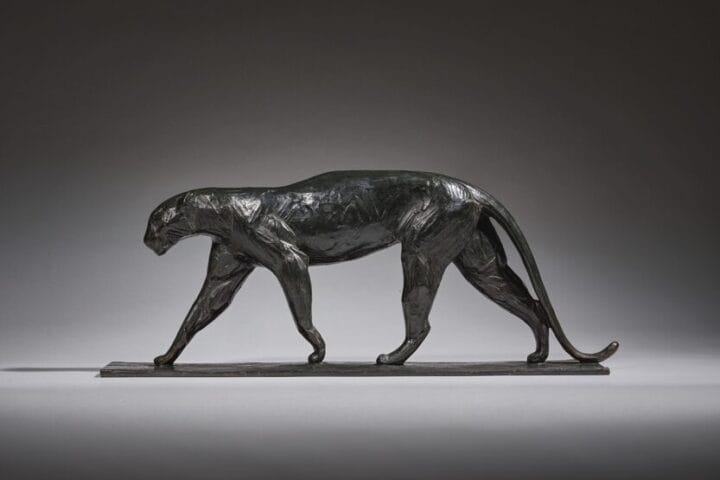A Magnificent ‘Tutti Frutti’ Bracelet By Cartier
Achieves $1.34 Million
In Sotheby’s Dedicated Online Auction
Representing:
The Highest Price for Any Jewel Sold in an Online Auction
**
The Highest Price for Any Jewel Sold at Auction in 2020
Sotheby’s Next Online Sale of Fine Jewels
Closes for Bidding Tomorrow
New York, 28 April 2020 – This morning, Sotheby’s sold a magnificent ‘Tutti Frutti’ Bracelet by Cartier for $1,340,000. Created circa 1930, the sensational jewel had never before appeared at auction, having been passed down through descendants of an American family for more than 30 years.
Pursued by 5 bidders, the Art Deco masterpiece far-surpassed its estimate of $600/800,000, becoming: the highest price for any jewel sold in an online sale as well as the highest price for any jewel sold at auction in 2020, at any house. Only one other work has achieved a higher price in an online sale at Sotheby’s (Friedrich von Hayek’s Nobel Prize in Economics from 1974, sold in 2019 for $1.5 million).
Catharine Becket, Head of Sotheby’s Magnificent Jewels Auctions in New York, commented: “The result achieved for this bracelet is testament to the fact that, even under the most challenging of circumstances, the demand for great art endures. Tutti Frutti jewels have always held a special allure for collectors, capturing the West’s fascination with the ‘exotic’ at a time when travel was relatively limited, much as it is today. Now, of course, we can connect with the touch of a button, which allowed us to engage with bidders worldwide. We look forward to bringing more great jewels to the marketplace in the months ahead as we expand our calendar of online sales.”
Sotheby’s online auctions of jewelry have raised $7.4 million to-date in 2020 (combined estimate $4.7/6.5 million), with an exceptional 93% of all lots sold. These sales regularly attract participants from over 30 countries, and with 30% of all bidders transacting with Sotheby’s for the first time. This continues a trend observed across all of our global jewelry auctions in 2019 (both live and online), in which more than half of all jewelry buyers placed their bids online.
THE HISTORY OF TUTTI FRUTTI
Celebrated as the “holy grail” of jewelry, tutti frutti designs by Cartier are joyous celebrations of texture, form and color that are coveted today as icons of the Art Deco era. The artful arrangement of carved colored stones and diamonds, together with the precise application of black enamel, uniquely illustrate the marriage between Eastern and Western influences on Art Deco jewelry design.
Cartier produced tutti frutti jewels in a variety of forms, with bracelets widely regarded as the most desirable. All share the hallmark of Moghul-cut colored stones – but each piece is unique. The present example is distinguished by the vibrancy of its gemstones, predominated by rubies, and by the lines of black enamel, applied to just one side, in an echo of the organic asymmetry of the carved gems. The bracelet returns to a more traditional Art Deco aesthetic with its pavé-set diamond clasp, highlighted by onyx triangles and chevron-shaped closures.
Pierre Cartier’s first foray into the tutti frutti style in 1901 was a necklace for Queen Alexandra who, as the wife of King Edward VII and by extension Empress Consort of India, commissioned a piece to complement three Indian-style dresses. The master jeweler’s necklace succeeded in blending the sumptuous curves and dazzling colors associated with the perceived exoticism of India with the techniques of modern craftsmanship perfected at the House of Cartier. The necklace opened the door to future Royal commissions and became the basis for the firm’s most celebrated jewels of Eastern inspiration. However, it wasn’t until 1911, when Pierre Cartier’s brother Jacques ventured to India, that this style truly came to life.
Upon observing India’s exotic culture and traditions, Jacques’ business expedition soon developed into an educational journey that would influence how his family firm would design jewels for years to come. He returned to his London workshop teeming with inspiration, incorporating the fulgent colors and rich textures of carved Moghul gemstones into the geometric platinum and diamond mountings crafted at Cartier. After being exhibited at the 1925 Exposition Internationale des Arts Décoratifs et Industriels Modernes in Paris, tutti frutti jewels rapidly gained popularity among the most fashionable and discerning collectors of the day, including Mrs. Cole Porter and Daisy Fellowes.













